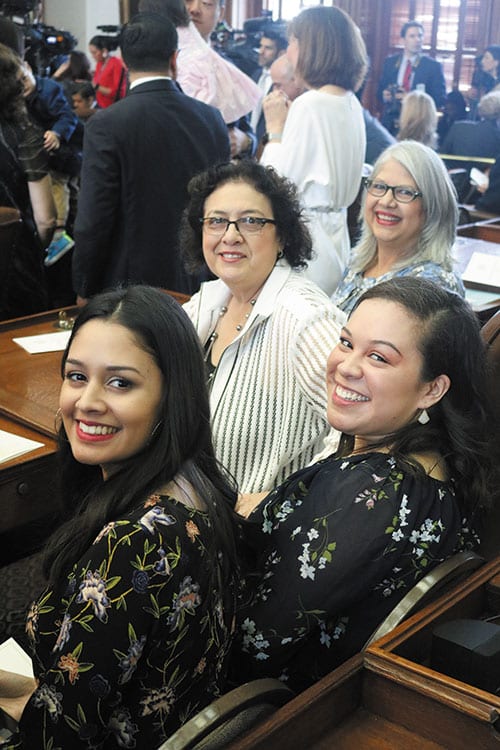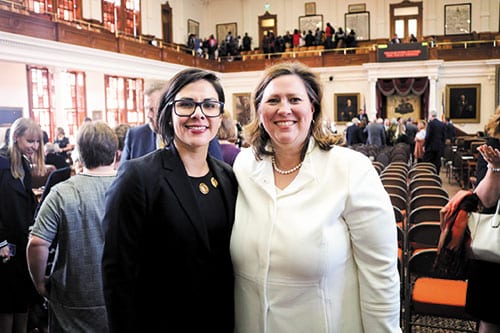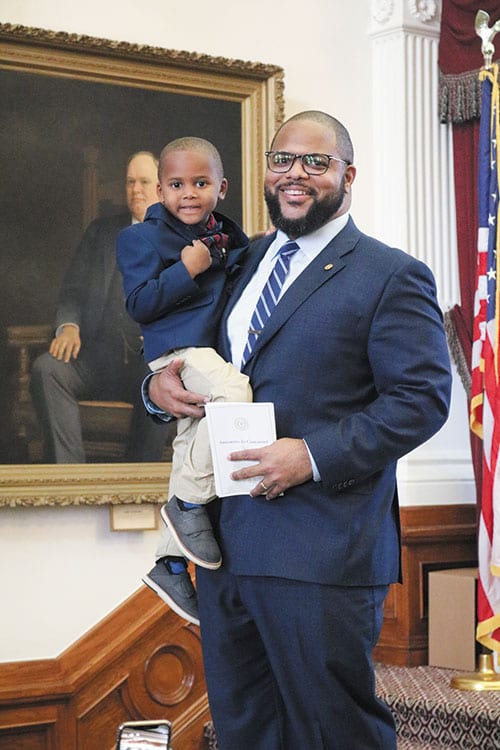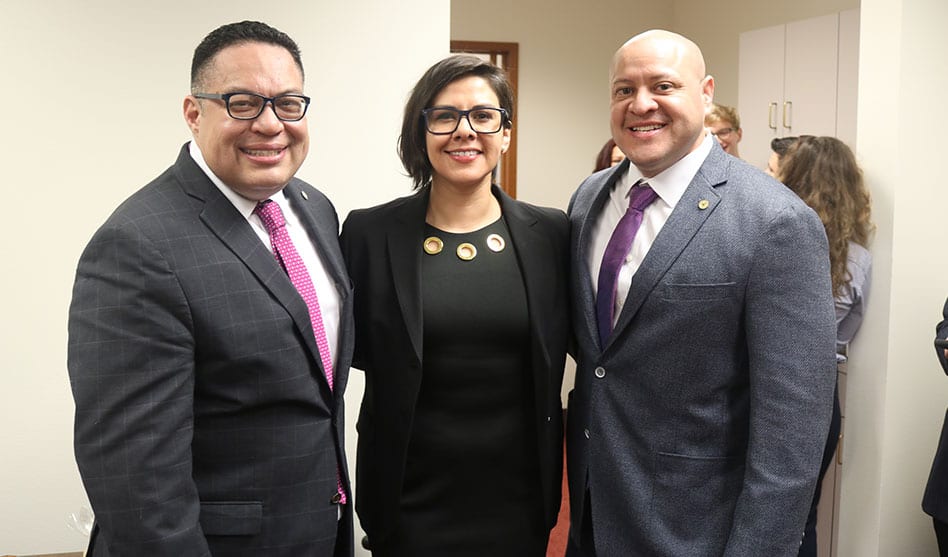Omar Narvaez, Jessica Gonzalez and Adam Medrano
LGBT lawmakers, allies hopeful 86th Legislature won’t see bills targeting the community
Daniel Hernandez | Contributing Writer
d.orlando.hernandez@gmail.com
The Texas Legislature gaveled in on Tuesday, Jan. 8, for its 86th regular session, with lawmakers expected to tackle issues ranging from healthcare and public education to border security and voting rights. For 140 days, lawmakers will debate bills under the pink dome of the Capitol in hopes of changing state laws and policies that affect Texans statewide.
The number of bills filed has steadily increased since the last peak in 2009. The 2017 session saw more than 6,600 House and Senate Bills filed. With this growth comes an increase in the number of bills filed relating — both directly and indirectly — to the LGBT community.
For the last several sessions, a handful of these bills have proved to be controversial or discriminatory, and many drew swift backlash from the LGBT community and its allies. For example, last session Republican lawmakers tried to pass Senate Bill 6, a “bathroom bill” that would have required a person to use the bathroom, shower or changing facility that corresponded with the sex assigned on their birth certificate or driver’s license, rather than the facility appropriate to their actual gender.

Celia Israel
The law would have applied only to facilities owned by government entities, including public and open-enrollment charter schools.
Although SB 6 passed easily in the Senate, the bill — and the issue — died in the House where then-Speaker Joe Straus used procedural moves to stymie it.
The legislation met a similar fate when filed again during the 85th Special Session.
When asked about the likelihood of a similar bill finding its way to the floor this session, some lawmakers were optimistic that comparable legislation would not gain any traction in either chamber. Sen. José Rodríguez, El Paso leader of the Senate Democratic Caucus, said, anything is possible, but the talk so far has been focused on school finance and other important issues. While this has been a priority item in the past, I do not believe it is for enough senators on both sides to push through, and the House definitely does not appear to have an appetite for another contentious battle along those lines.
Texas Lt. Gov. Dan Patrick, the most vocal proponent of a bathroom bill in 2017, said in a press conference Wednesday, Jan. 9, that he sees no reason to pursue the issue in this session because, even though the bill was defeated two years ago, he believes proponents “won” the battle because the behaviors within the state’s school districts that had prompted the bill have stopped. He gave no evidence to support his claim.
While Republicans maintained their majorities in both the House and Senate after the November midterm elections, Democrats picked up a number of seats in both chambers. State Rep. Celia Israel, D-Austin, said she hopes that this session will prove to be productive due in part to this shift in the House.
“I’m hopeful that for this session, we can focus our efforts on the real, tangible issues that affect our quality of life in the state of Texas,” Israel said. “We have a lot of new opportunities with these new members to help set the example of working across the aisle and getting some real work done.”

Jessica Gonzalez and Julie Johnson
Former Speaker of the House Joe Straus, R-San Antonio, did not run for re-election, leaving the speaker’s seat open coming into this session. Rep. Dennis Bonnen announced his candidacy for the speakership last October, and weeks later declared he had secured 109 votes for his election, significantly more than the 76 required to win the seat.
On opening day, Bonnen drew no opponents to his nomination and was elected unanimously by the membership. In a speech after his swearing in, Bonnen delivered a message of unity and cohesion, while making clear that he is ready for House members to have candid conversations about the issues facing Texans.
“When people call me challenging, believe me, my dad is nodding his head in agreement from above,” Bonnen said. “[He] always told us, say what you mean and do what you say, so I’ve never seen the point in sugarcoating things, especially when that might confuse the issue, or slow down progress towards a more meaningful result.”
In the Senate, Republican Lt. Gov. Dan Patrick remains at the helm after being re-elected in November. Senate Republicans will enter the session with 19 seats, while Democrats saw their numbers rise from 11 seats to 12.
Sen. Rodríguez says he is hopeful that even this small change will make a big difference this session.
“There has been a change in attitude because of the mid-term elections,” Rodriguez noted. “I think legislators feel the temperature changing. Balance in the process is good thing; it allows compromise and a search for solutions, rather than rhetoric and ideological battles.”
As of Jan. 8, no specifically anti-LGBT legislation had been filed, although Sen. Bob Hall, R-Edgewood, did file SB 85, a so-called religious freedom bill that allow professionals in certain counseling fields to refuse to treat “a person if providing the service would cause the license holder to violate a sincerely held religious belief.” Such measures usually are used to target LGBT people.
Lawmakers have until March 8 to file legislation, so other measures targeting LGBT people are likely to pop up.
Several LGBT-positive bills have been filed, some of which were debated in earlier sessions but ended up not passing.
In the Senate, two bills have been filed that would repeal the state’s sodomy law, Section 21.06 of the Texas Penal Code, which has been obsolete since the U.S. Supreme Court struck it down in 2003 in Lawrence v. Texas. Sen. José Menéndez, D-San Antonio, and Sen. Rodriguez have both filed bills that would repeal the unconstitutional language. Rodríguez has filed similar legislation every regular session since 2013 but none of those bills have ever passed the full Senate.

Eric Johnson holding William
State Rep. Joe Moody, D-El Paso, has filed similar legislation in the House since 2013, with similar results. The bill filed by Menéndez also includes language repealing the state law prohibiting the issuance of marriage licenses to same-sex couples. This language was nullified by the landmark marriage equality ruling, Obergefell v. Hodge, made by the Supreme Court in 2015.
While the anti-marriage equality law has no legal weight due to the Supreme Court ruling, Rodríguez says this bill, and others targeting LGBT equality, remain priorities for him.
“Simply put, it’s the right thing to do,” Rodriguez said. “I never did and never will understand why some people feel so threatened by others who may appear different, whether because of skin color, religious beliefs, gender or sexual orientation. Blind prejudice throughout history has caused so much suffering, and in a free and diverse country such as ours, has no place in determining public policy.”
Israel has filed a bill that would ban the practice of conversion therapy on minors by mental health providers in the state. Fourteen states currently have laws banning the practice while some cities in other states offer protections through local ordinances.
“It’s important to just let kids be kids,” Israel explained. “When we have so-called professionals who say they can fix our kids with these practices, I feel like we do more harm than good when we validate [the practices].”
She has filed the bill in the last two sessions, but it has never received a committee hearing.
While this session may not produce any major advancements for the LGBT community, anticipation lingers that change is on the horizon in Texas. Asked about the future of LGBT rights in Texas, Rodriguez was optimistic about what the community may see in the future.
“As the former president said, the arc of history bends toward justice. At the very least, at some point enough moderates will realize it’s just bad policy to have unconstitutional laws on the books,” he said. “But beyond that, most people know that we’re defined by our character, not by our orientation, and policies that discriminate against LGBT Texans are wrong. I’m not sure when that will happen, but things are changing, and I’m hopeful they will change quickly.”













